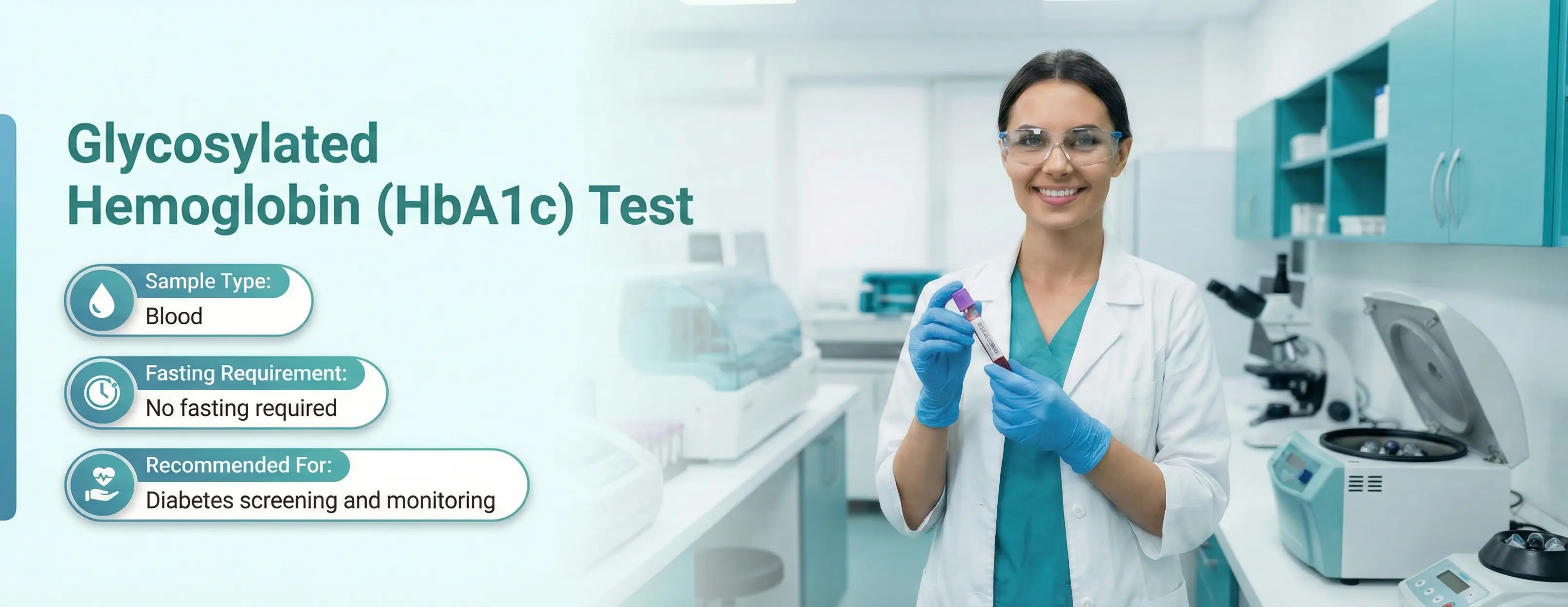4795+ orders placed in your location
100% NABL & ISO Certified Lab • 100% Accurate Reports
Glycosylated Hemoglobin (HbA1c) Test
Glycohemoglobin Test, Glycosylated Haemoglobin Test, Glycated Haemoglobin Test, Haemoglobin A1C Test
- SummaryThe HbA1c test helps with the screening, diagnosis and monitoring of diabetes or prediabetes in adults. It enables you to identify if you are on the edge of developing diabetes. This test is done by taking a blood sample from a vein or a finger prick, and no fasting is required for this test.Read more
- TestsIncludes 2 tests
- Reports Within8 HrsView Sample Report100% NABL & ISO Certified Labs
- SampleBlood
- AgeAll Age Group
- GenderMale and Female
- FastingNot Required
PharmEasy Promises
Know More About The Test
A quick info on HbA1c test
Overview
The HbA1c Test, also known as Glycosylated Hemoglobin, also called Glycated Hemoglobin or Hemoglobin A1c, helps with the screening, diagnosis and monitoring of diabetes or prediabetes in adults. It enables you to identify if you are on the edge of developing diabetes. If you already have diabetes mellitus, the HbA1c test results help monitor your blood sugar levels.
The Haemoglobin A1C (HbA1c) test measures the average amount of glucose attached to the haemoglobin. This test gives you an average of three months because red blood cells live for about three months. This test can be taken by people of all age groups and/or as recommended by your doctor.
The HbA1C test measures the amount of blood sugar (glucose) that gets attached to the haemoglobin. Haemoglobin is a protein present in your blood that carries oxygen from your lungs to the other organs and cells in your body. The haemoglobin A1C (HbA1C) test measures the average amount of glucose that gets attached to the haemoglobin over three months. This test gives you an average of three months because red blood cells live for about three months or 120 days.
The HbA1C test helps diagnose diabetes or prediabetes in adults. It helps you identify if you are on the edge of developing diabetes.
If you are already having diabetes mellitus, the HbA1C test results help monitor your blood sugar levels. The three-month average gives an update on the status of your condition. Based on the values of the test, your doctor will assess your progress.
Sample Type
The glycosylated haemoglobin test is done by taking a blood sample. This test can be combined with your other regular tests or can be done separately.
Risk Assessment
Type 1 Diabetes Mellitus, Type 2 Diabetes Mellitus, Prediabetes
What does this Test Detect?
The HbA1C test measures the average blood sugar levels in your body over three months. It measures the percentage of haemoglobin A1C in your blood to which glucose gets attached. The more the amount of glucose in your blood, the higher the chances of it getting attached to haemoglobin.
Indications for HbA1C Test
The HbA1C test is advised for all age groups and genders. It is used for-
- Screening of Prediabetes: A condition where your blood sugar levels are higher than normal but not high enough to be diagnosed as diabetes mellitus.
- Monitoring and Diagnosis of Diabetes - A chronic condition where your body does not produce enough insulin or is resistant to insulin.
The HbA1C test is suggested for people who are more prone to developing diabetes. These groups include those who are:
- Above 40 years of age.
- Have a family history of diabetes.
- Have prediabetes.
- Obese or overweight.
- Have had gestational diabetes (diabetes during pregnancy) or given birth to a baby who has weighed more than 4 kgs.
- Females with PCOS
- Not much physically active (less than three times a week)
How Frequently should you take this Test?
The HbA1C test is repeated based on the following parameters -
- The type of diabetes one has.
- Your blood sugar management.
- Your blood sugar treatment plan.
The frequency of testing for each of these parameters differs as follows -
- If you have type 2 diabetes, repeat the test every three to six months if you have type 1 diabetes, repeat the test every three months.
- If you have prediabetes, repeat the test every year.
You may need to repeat your HbA1C test more frequently if -
- You are on insulin.
- Your blood sugar levels are poorly controlled.
- Your doctor needs to change your treatment plan.
Test Preparation
The glycosylated haemoglobin test requires you to give a sample of your blood. When performed, the technician will take the blood sample from your vein. The blood sample is taken by pricking the finger with a needle.
Before the test
This test does not require any specific preparations from your end. You can take the test at any time during the day before or after meals. But if your doctor prescribes a series of other tests, along with the HbA1C test, then you may need to prepare accordingly.
During the test
You do not need to prepare for anything during the HbA1C test. It is a simple blood test that takes about 5-10 minutes.
After the test
There are no restrictions after taking this test. You can return to your usual activities after the HbA1C test.
Parameters
The HbA1C test report gives you a reading of only your average blood sugar levels over the last three months.
Test Result Interpretation
HbA1c test results are in the form of percentages. You can see the reference ranges to interpret your test results. Based on these reference ranges, you can understand if you are in the HbA1c test normal range or if you are in the prediabetes phase or have diabetes.
Normal | Below 5.7% |
Prediabetes | 5.7 - 6.4% |
Diabetes | At or above 6.5% |
The normal values and reference ranges of the test may vary from lab to lab. Please refer to the ranges mentioned in the report and consult a doctor to understand the interpretation of lab reports.
Your doctor will not rely on the HbA1c test results alone to diagnose diabetes. You may have to undergo a series of other tests and examinations to confirm your diabetes situation. To understand what your test results mean, consult your doctor and get all your queries solved. HbA1c target goals may vary for different patients undergoing treatment for type 2 diabetes. Discuss this with your doctor.
Price/Cost
The price of an HbA1c Test can fluctuate based on the location and chosen laboratory. Generally, the cost of an HbA1c test falls within the range of INR 349 to 769. Let's take a look at the average cost of an HbA1c test in some major cities in India:
City | Min Price | Average Price | Max Price |
339 | 554 | 769 | |
339 | 554 | 769 | |
339 | 554 | 769 | |
339 | 554 | 769 | |
339 | 554 | 769 | |
339 | 554 | 769 | |
339 | 554 | 769 | |
339 | 554 | 769 | |
339 | 554 | 769 | |
339 | 554 | 769 |
Risk and Limitations
The HbA1C blood test is accompanied by a low chance of complications.
However, seek medical advice should these issues crop up
- Unabated bleeding at the blood-extraction site
- Pain or inflammation at the puncture.
Limitations of the test
- Potential inaccuracies due to equipment errors, or human mistakes
- Misinterpretation of markers resulting in unreliable conclusions.
Was This Test Information Helpful?
Please rate your experience
References
Health packages containing 'Glycosylated Hemoglobin (HbA1c) Test'
People Also Ask
What is the normal HbA1c level?
What is the glycosylated haemoglobin test used for?
Is HbA1c at 6.3 normal?
What happens if glycosylated haemoglobin is high?
What is the fastest way to reduce HbA1c?
Have any doubts? Ask us.
Ask us anything about the Glycosylated Hemoglobin (HbA1c) Test to understand it better
We provide trusted, expert-curated health content to support better awareness,prevention, and care.
Backed by experienced doctors, medical experts, and strict editorial standards.


